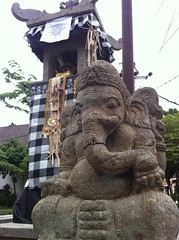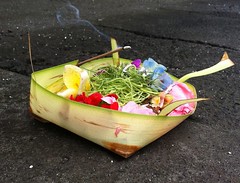 So one of the amazing things about being in Bali is how omnipresent their spirituality is. You litreally can't take two steps anywhere without nearly crushing a small offering on the ground in front of a store or a hotel. The offerings typically have some flowers, fruit and a cookie or cracker in a tiny woven leaf box. Thousands of them are put out every morning in each town, replacing the ones that get knocked over and weathered from the day before.
So one of the amazing things about being in Bali is how omnipresent their spirituality is. You litreally can't take two steps anywhere without nearly crushing a small offering on the ground in front of a store or a hotel. The offerings typically have some flowers, fruit and a cookie or cracker in a tiny woven leaf box. Thousands of them are put out every morning in each town, replacing the ones that get knocked over and weathered from the day before.
Temples are everywhere. Reportedly there are more temples than houses in Bali, some small structures in the entries of buildings and others massive structures with multiple buildings and courtyards.
Every block also has several idols, small statues and altars that are typically skirted by some fabric and sheltered by a small umbrella. Given the unpredictable weather, those skirts and umbrellas must need constant tending by locals.
And that's just the outward manifestation of spirituality in Bali that is apparent to outsiders. My understanding is that Balinese practice a unique form of Hinduism that also incorporates animism, in which various plants and animals are imbued with spirits. Much of the actions they perform are intended to appease the many gods, to ward off evil, and to bring good luck. They pray several times a day, and attend temple ceremonies every couple of weeks.
 I wonder if part of this spirituality has to do with their remarkable good fortune as a people. I mean, Bali really has no other industry besides tourism, which has greatly elevated their quality of life in comparison to comparable people's around them. People seem healthy, with regular jobs, schools, and hospitals. There doesn't even seem to be much class inequality, with everyone doing pretty well for themselves. All these foreigners from around the world just keep pouring into their small island and leaving their dollars and euros everywhere. Just give them some Bintang beer and cheap massages and watch the money flow in.
I wonder if part of this spirituality has to do with their remarkable good fortune as a people. I mean, Bali really has no other industry besides tourism, which has greatly elevated their quality of life in comparison to comparable people's around them. People seem healthy, with regular jobs, schools, and hospitals. There doesn't even seem to be much class inequality, with everyone doing pretty well for themselves. All these foreigners from around the world just keep pouring into their small island and leaving their dollars and euros everywhere. Just give them some Bintang beer and cheap massages and watch the money flow in.
I find it remarkable the lack of any kind of police or military presence in Bali that I've seen. In many of the developing countries I've travelled to, security personnel with automatic weapons are visible outside of public buildings, at major intersections and at frequent checkpoints. In Bali, I don't think I've seen a single firearm in the week that I've been here.
This is particularly notable since Bali has been the recipient of some of the most brutal terrorist attacks in the past few years, with two devastating bombings in the town of Kuta in 2002 and 2005 killing more than 200 people and injuring hundreds more.
These brutal attacks, which not only caused massive destruction and loss of life, also nearly decimated their number one industry, tourism. In other countries, like the United States, terrorist attacks like these led to greatly increased security measures and more restrictions on foreigners and citizens. It seems like in Bali, the main response, if any, was to become more spiritual, if that is even possible with these people.
It's a good reminder that we have options in responding to violence that don't have to mean simply more violence or "security theater." We can use violence as an occasion to remind ourselves of our connection to the divine, to deepen our relationship to the spirit that surrounds and inhabits us all.
Interesting post, Rik. I too was impressed by balinese spirituality. I especially liked its focus on balance/harmony: light and dark, good and evil (black and white checked fabric, offerings to demons on the ground, offerings to the gods on elevated platforms, etc.). Several balinese explained their 3x daily offerings to me as bhakti yoga. It’s beautiful.
I’m not sure about the “everyone doing well” financially comments, though. I met a lot of people that were struggling. I also met a number of extremely intelligent people with limited choices. High school isn’t free, so most have to go to work rather than continue their education. University is prohibitively expensive. So, learning some english and going into the tourist industry (as a driver, for example) becomes the best option. And Bali, a traditionally agrarian society, will soon be importing rice. It’s hard to make a living as a farmer anymore; and did you notice all the rice fields being turned into villas and guesthouses for tourists?
Agree, however, that that standard of living is pretty damned good for a developing country. And it is paradise, after all. 🙂
On violence: I asked one person his thoughts on violence, citing domestic violence as an example. He told me that the village is still the center of life for most balinese; and because everyone knows everyone, and because excess emotion and temper isn’t considered masculine in their culture, that type of violence is essentially non-existent. A man that, for example, is known to beat his wife would be ostracized by everyone he knows. Social censure is powerful. Harmony is valued.
Interesting, eh?
Yeah, I may be biased since I am interacting with locals who are dealing with tourists all the time. But I’m not seeing a lot of the typical signs of abject poverty — large slum areas, begging, malnutrition, etc.
I think that if I was from an agrarian community that had an influx of tourism and we started doing much better for ourselves, the temptation to stop being so religious might be quite strong. I’ve seen that in other tourist regions of other developing countries. That doesn’t appear to have happened in Bali.